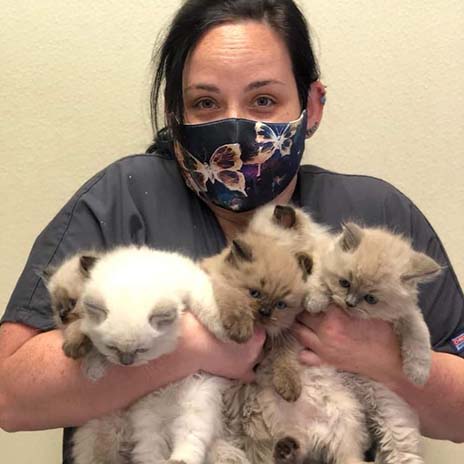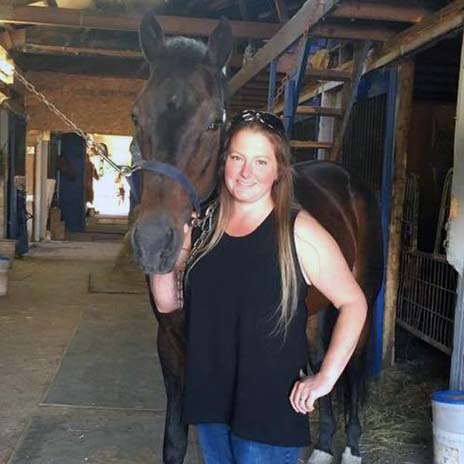Contact: Cherie Yurco
cmyurco@dcccd.edu
For immediate release — Oct. 5, 2021
(DALLAS) — A new, specialized curriculum is making Dallas College’s Veterinary Technology offerings available worldwide and conveniently available to trainees who care for animals in-person but are not able to set foot on campus.
Whether living in Texas or thousands of miles away, the Dallas College “Vet Tech” program has adapted for the 21st century, now bringing opportunities to those unable to study in a traditional setting. The program, which began in 1998 as a partnership with the American Animal Hospital Association (AAHA), now serves students from as far away as Hong Kong, the United Arab Emirates, Germany and South Africa.
Dr. Kelly Black, department chair of the Veterinary Technology program at Dallas College, played a major role in developing the curriculum that allows students to learn through a combination of remote instruction and curated on-the-job training in their own workplaces.
“A lot of our students are already working in vet clinics as assistants, receptionists or kennel help [outside of Dallas] when they join the program,” he said.
The online program allows Dallas College to train about three times as many students as it could on campus. In a typical year, the campus program can only accept about 100 out of the 175 to 200 applications it receives. An additional 420 students are currently training through the online program. Once they’ve completed their degrees, students are qualified to take their Veterinary Technician National Examination (VTNE) to become a licensed veterinary technician (LVT).
“Obviously we have limited space, staff and patients available for the campus program,” said Dr. Patricia Eye, veterinary technology faculty member. “If they are working in their own clinic, we can use a lab in Ireland, for example.”
Minnesota Student Lands Dream Job
Enrique Limon of Chanhassen, Minn., received his Veterinary Technology degree from Dallas College this summer. He already had a bachelor’s degree in animal science when he decided he wanted to get certified as a vet tech. “I like the hands-on work,” he said. “But what really got me into this field was that I can help people and animals at the same time.”
He began studying at an in-person program near his home, but it closed down before he could finish. “Then,” he said, “I did a good old-fashioned Google search!”
When Dallas College popped up, he recalled that one of his mentors had studied through the program. “She really loved it and said she got a lot out of it,” said Limon.
The course only took him about a year and a half to complete, even while working full time. And Limon, who was working in a general practice at the start of the program, landed a new job at the University of Minnesota Veterinary Medical Center before he had even finished. Now he helps train others.
Limon was a little unsure about the online nature of the program when he began. In the end, the thing he was most worried about — having to submit videos to document his clinical work — was the best part of the program.
“I am very camera shy,” he admitted. “Making those videos was one of the scariest things I had to do but the most beneficial. It helped me gain confidence in explaining procedures to clients, as well as teaching new technicians and fourth-year veterinary students who are doing their clinicals.”
As classes progressed, he was able to work with each service, learning from and building relationships with the doctors and technicians at the medical center. Beyond that, Limon says that Dallas College instructors taught him how to use all the resources available, and their feedback was invaluable. “What I loved most was being able to learn something at school and then immediately apply it to my everyday work life,” he said.
Because his work at the university hospital mainly deals with dogs and cats, Limon travelled to the Dallas College Cedar Valley Campus for two intensive, fast-track labs to gain experience with large animals and lab animals.
Working Mom Advances in Career

“I was really excited when I found out about this program,” said Vet Tech student Krystle Reed. “I can do it from home while working full time and raising a child.”
Nestled into her study spot with three cats and a dog, Krystle Reed of Montgomery, Texas, said she has always loved animals. She works full time at Veterinary Medical Center of The Woodlands — a six-doctor practice that sees cats, dogs and pocket pets — located about 30 miles north of Houston.
“I find being a technician very rewarding,” she said. “The best part is meeting new animals and educating people about how to take care of them.”
“I’ve only ever worked in veterinary hospitals. I’ve been a job-trained veterinary technician for about 17 years, not a licensed one,” she said. “I wanted to further my career and one day do zoo medicine and work with big cats, but that requires an LVT.”
Even for her current job at the animal hospital, the training will pay off. “LVTs have more responsibilities and can do more to help the doctors,” she said. “It opens up the opportunity to move to other places that require you to be licensed.”
Reed discovered Dallas College when one of her colleagues showed her a brochure. “I was really excited when I found out about this program. My daughter was getting ready to start kindergarten, so I knew I would have a little extra time,” she said. “I can do it from home while working full time and raising a child.”
Reed has been studying part time for about three years and is now in her final semester. She said, “It’s definitely more affordable than the in-person schools in my area, which are an hour away. This has been a real blessing.”
She said Dr. Black makes students feel at ease by showing his sense of humor even though it’s long distance. She credits the two amazing LVTs she works with for helping her complete her tasks on recorded videos. “I put a little bit of my personality into the videos,” she said.
“I knew a lot about how to do things, and now I know
why we do them.” It’s also opened up opportunities to learn new things. This semester she’s taking Fear Free training to learn techniques to reduce stress, aggression and discomfort for animals in the clinic.
Canadian Student Changes Careers

With a curriculum that combines remote instruction and on-the-job training, the Dallas College Veterinary Technology program serves students from as far away as Hong Kong, the United Arab Emirates and South Africa. Student Mandy Ellis (pictured with Grand Ball) lives in Nova Scotia, Canada.
Mandy Ellis of Bible Hill, Nova Scotia, Canada, is in her second semester of the Veterinary Technology program. She is taking one class at a time as she works full time at the Central Nova Animal Hospital and part time at another job. For her, this is a second chance at her dream career.
“I always wanted to be a veterinarian; I got my pre-veterinary medicine degree when I was fresh out of high school,” she said. “Then, life took its turns, and I got married and followed a different path.”
When the jewelry company she was working for closed, she thought it was the perfect time to go back to her passion for animals. That’s when she was hired as a veterinary assistant. She learned about the Dallas College Veterinary Technology program through AAHA.
“I enjoy being able to help solve problems and make pets and their owners feel better,” she said. “At the end of the day, you feel like you’ve done something good.”
She said she’s already been able to apply what she’s learned. “I’ve only been at the clinic for two years, so I’m one of the newest members.”
She enjoys putting in extra time to learn about her career and earn her required clinic hours. “I’ve done some extra activities, like coming in after hours for a C-section,” she said.
For Ellis, becoming a vet tech will allow her to take on a more versatile role at the animal hospital. “I will be able to do more things, like work in the lab and run samples as well as assist in certain surgeries on a more hands-on level. I’m also really interested in the dentistry side of things,” she said.
“Everyone has been extremely supportive,” Ellis said. “I think the program is amazing for people like myself for whom going back to school in a traditional manner doesn’t fit our lifestyle but yet we are really passionate about this line of work.”
# # #